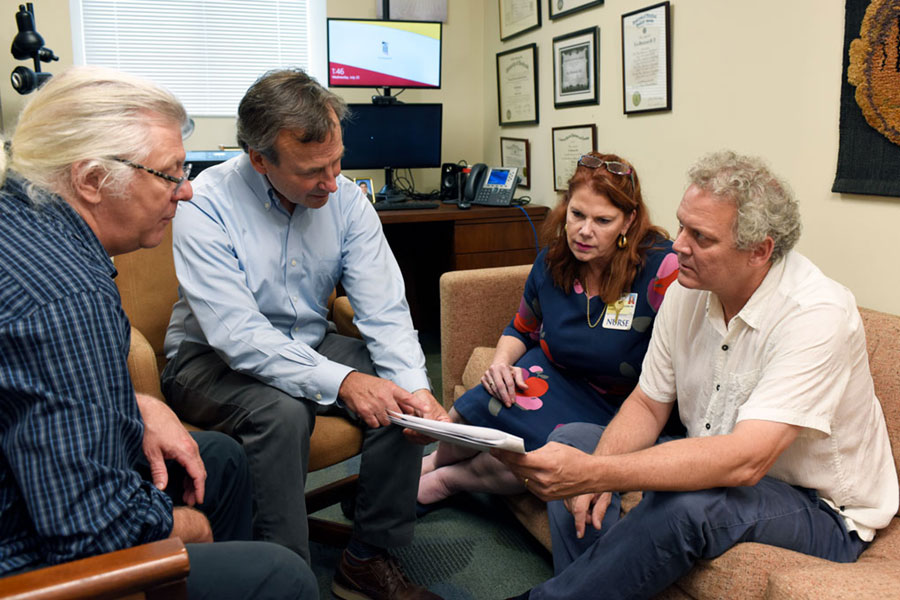Research Initiatives

The Division of Addiction Research and Treatment receives extensive external funding for its research and clinical initiatives. Recent and ongoing projects include the following:
MAI - High Risk Populations in Baltimore City
The principal aims of this project are to strengthen patient engagement and improve linkage to integrated mental health and substance abuse services for high risk, ethnic and racial minorities seeking substance use treatment.
SOAR: Smartphones for Opiate Addiction Recovery
The Division is a participating site in this trial funded by NIH. The primary goal in this clinical trial is to test smartphone-based battery to predict reuse rates amongst OUD patients and evaluate whether physicians who use the output of mobile system to adjust dosing achieve lower opiate reuse rates compared to care as usual.
Peer-Delivered Behavioral Activation Intervention to Improve Polysubstance Use and Retention in Mobile Telemedicine OUD Treatment in an Underserved, Rural Area” (PRISM)
This NIH funded study proposes to evaluate the effectiveness and implementation of the PRS-delivered BA intervention integrated into the Telemedicine Mobile Treatment Unit (MTU) (“Peer Activate-MTU”) compared to enhanced treatment as usual.
Peer-Delivered Behavioral Activation Intervention to Improve Adherence to MAT Among Low-Income, Minority Individuals with OUD
Funded by NIH, the goal of this study is to develop an evidence-based Peer Recovery Coach-delivered treatment model that can be sustainably delivered to improve MAT retention for low-income, minority individuals with OUD.
Impact of COVID-19 on Methadone Treatment Retention
The aim of this NIH funded proposal is to understand the impact of COVID-19 response-related changes on retention and adherence in methadone treatment for an underserved, low-income, largely minority population of OUD diagnosed individuals.
Using PRCs to Address Stigma in Methadone Treatment
The aim of this NIH funded proposal is to test how a peer recovery coach model can reduce multiple intersecting stigmas among low-income, racial/ethnic minority individuals to improve retention in methadone treatment.
LOOP: Long Term Outcomes of Opioid Use Disorder
Funded by the John C. Martin Foundation, LOOP is a 200-subject natural history investigation to understand the long-term outcomes associated with high-risk populations affected by opioid use disorder. Outcomes of interest include rates of co-morbid psychiatric symptoms and illness, overdose, HCV re-infection, and HIV infection.
PURPLE / PEARL
The division is committed to implementing patient centered care and research. This proposal supported the formation and development of the 1001 clinic patient research advisory committee (RAC). This group of patients and investigators work together to generate research ideas informed by those with lived experience as well as ensure its relevance and dissemination to the community served.
Treatment with Buprenorphine through Telemedicine in a Rural Criminal Justice Setting
Funded by the FORE Foundation, the goal of this program is to implement new programs of telemedicine-based medications for OUD within rural detention centers in Maryland.
A Multicenter, Randomized, Double Blind, Placebo Controlled, Phase 2 Pharmacogenetic Study of Ondansetron in Alcohol Use Disorder
This 20-week research study is being conducted to learn whether a medication called ondansetron, combined with brief counseling, is more helpful than placebo in reducing the number of heavy drinking days in people with an alcohol use disorder (AUD) who want to reduce or stop their drinking, and who also have specific genetic characteristics.
ANCHOR Study
A multisite pilot study to evaluate a model of care for treatment of chronic hepatitis C in people with ongoing or recent injection drug use.
Augmenting MAT Treatment Outcomes
A longstanding research program exploring psychosocial interventions to augment MAT treatment outcomes.
Biomarkers to Measure Treatment Response for Alcohol Dependence
The primary objective of this research study is to validate a genomic biomarker to explore its potential as a test that can predict the amount of recent heavy drinking. Secondary objectives include exploration of other novel molecular biomarkers of heavy drinking present in blood.
DOTS Project
Collaboration with UMCP to identify novel synthetic substances in patients presenting at PES with atypical psychosis.
Geospatial Analysis of Access to Medication-Assisted Treatment Project
Collaboration with the Center for Geospatial Information Science (UMCP) and CESAR (UMCP) to conduct geographic analyses of methadone patients’ residence information. Examines the geospatial determinants of where patients seek treatment and evaluates patient retention and treatment outcomes. Awarded DRI funds from UMCP.
MPower Opioid Use Disorder Project
Collaboration with epidemiologists (CESAR, UMCP) to conduct comprehensive urine toxicology screens and drug use questionnaires from patients in methadone treatment. Goal is to understand patterns of drug use in West Baltimore.
Navigation Services to Avoid Rehospitalization (NavStar) Among Substance Abusers
Collaboration between he Division of Addiction Research and Treatment's Substance Abuse Consultation Service (SACS) and Friends Research Institute that tracks how navigation services can reduce re-hospitalizations in patients with substance use disorders. Funded by NIDA.
Pharmacogenetic Treatment with Anti-Glutaminergic Agents for Comorbid Post Traumatic Stress Disorder & Alcohol Use Disorder
The primary objective of this 14-week research study is to determine the efficacy of a medication called pregabalin, administered orally for a period of 12 weeks, in reducing heavy drinking and symptoms of Post Traumatic Stress Disorder (PTSD) among individuals who have selected genotypes at the gamma-amino butyric acid transporter and receptor genes. The secondary objective is to assess the safety and tolerability of pregabalin in participants with alcohol use disorder (AUD) and co-occurring PTSD.
Placebo Project
Pilot study exploring the use of open-label dose-extending placebos as an adjunct to methadone treatment to enhance treatment outcomes. Funded by a Foundation grant, conducted in collaboration with faculty from the school of nursing.
Training Health Care Professionals
A SAMHSA grant to fund SBIRT training for healthcare professionals.
